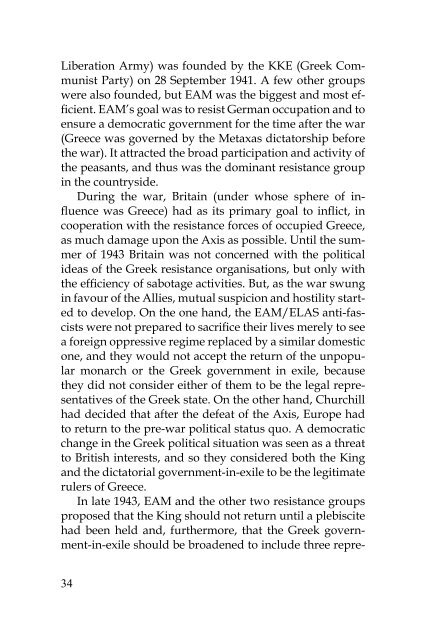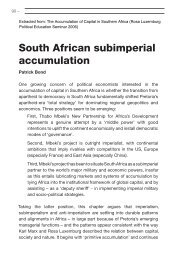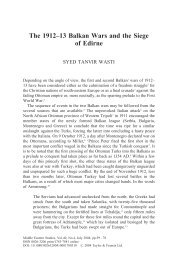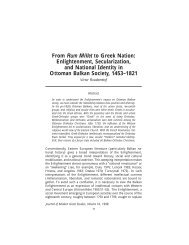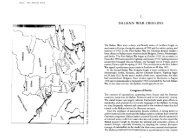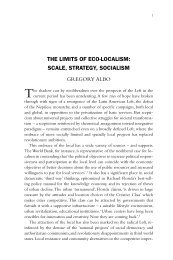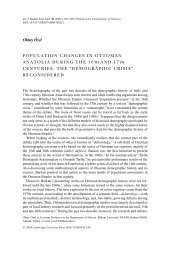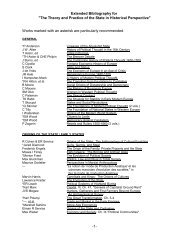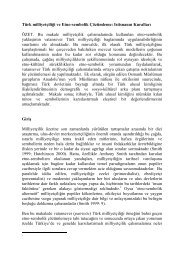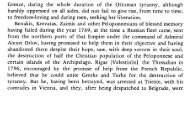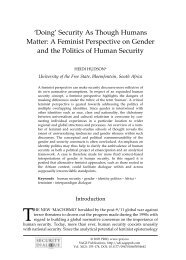The Greek diaspora in Eastern Europe and the Former Soviet Union
The Greek diaspora in Eastern Europe and the Former Soviet Union
The Greek diaspora in Eastern Europe and the Former Soviet Union
You also want an ePaper? Increase the reach of your titles
YUMPU automatically turns print PDFs into web optimized ePapers that Google loves.
Liberation Army) was founded by <strong>the</strong> KKE (<strong>Greek</strong> Communist<br />
Party) on 28 September 1941. A few o<strong>the</strong>r groups<br />
were also founded, but EAM was <strong>the</strong> biggest <strong>and</strong> most efficient.<br />
EAM’s goal was to resist German occupation <strong>and</strong> to<br />
ensure a democratic government for <strong>the</strong> time after <strong>the</strong> war<br />
(Greece was governed by <strong>the</strong> Metaxas dictatorship before<br />
<strong>the</strong> war). It attracted <strong>the</strong> broad participation <strong>and</strong> activity of<br />
<strong>the</strong> peasants, <strong>and</strong> thus was <strong>the</strong> dom<strong>in</strong>ant resistance group<br />
<strong>in</strong> <strong>the</strong> countryside.<br />
Dur<strong>in</strong>g <strong>the</strong> war, Brita<strong>in</strong> (under whose sphere of <strong>in</strong>fluence<br />
was Greece) had as its primary goal to <strong>in</strong>flict, <strong>in</strong><br />
cooperation with <strong>the</strong> resistance forces of occupied Greece,<br />
as much damage upon <strong>the</strong> Axis as possible. Until <strong>the</strong> summer<br />
of 1943 Brita<strong>in</strong> was not concerned with <strong>the</strong> political<br />
ideas of <strong>the</strong> <strong>Greek</strong> resistance organisations, but only with<br />
<strong>the</strong> efficiency of sabotage activities. But, as <strong>the</strong> war swung<br />
<strong>in</strong> favour of <strong>the</strong> Allies, mutual suspicion <strong>and</strong> hostility started<br />
to develop. On <strong>the</strong> one h<strong>and</strong>, <strong>the</strong> EAM/ELAS anti-fascists<br />
were not prepared to sacrifice <strong>the</strong>ir lives merely to see<br />
a foreign oppressive regime replaced by a similar domestic<br />
one, <strong>and</strong> <strong>the</strong>y would not accept <strong>the</strong> return of <strong>the</strong> unpopular<br />
monarch or <strong>the</strong> <strong>Greek</strong> government <strong>in</strong> exile, because<br />
<strong>the</strong>y did not consider ei<strong>the</strong>r of <strong>the</strong>m to be <strong>the</strong> legal representatives<br />
of <strong>the</strong> <strong>Greek</strong> state. On <strong>the</strong> o<strong>the</strong>r h<strong>and</strong>, Churchill<br />
had decided that after <strong>the</strong> defeat of <strong>the</strong> Axis, <strong>Europe</strong> had<br />
to return to <strong>the</strong> pre-war political status quo. A democratic<br />
change <strong>in</strong> <strong>the</strong> <strong>Greek</strong> political situation was seen as a threat<br />
to British <strong>in</strong>terests, <strong>and</strong> so <strong>the</strong>y considered both <strong>the</strong> K<strong>in</strong>g<br />
<strong>and</strong> <strong>the</strong> dictatorial government-<strong>in</strong>-exile to be <strong>the</strong> legitimate<br />
rulers of Greece.<br />
In late 1943, EAM <strong>and</strong> <strong>the</strong> o<strong>the</strong>r two resistance groups<br />
proposed that <strong>the</strong> K<strong>in</strong>g should not return until a plebiscite<br />
had been held <strong>and</strong>, fur<strong>the</strong>rmore, that <strong>the</strong> <strong>Greek</strong> government-<strong>in</strong>-exile<br />
should be broadened to <strong>in</strong>clude three representatives<br />
of <strong>the</strong> resistance organisations. K<strong>in</strong>g George II<br />
<strong>and</strong> <strong>the</strong> government rejected <strong>the</strong> proposal on <strong>the</strong> “advice”<br />
of Churchill <strong>and</strong> Roosevelt who assured <strong>the</strong>m that <strong>the</strong>y<br />
would offer <strong>the</strong>ir support, <strong>and</strong> supervised <strong>the</strong> purge of <strong>the</strong><br />
<strong>Greek</strong> army from Communist <strong>and</strong> democratic officers. <strong>The</strong><br />
next British step was to approach <strong>the</strong> o<strong>the</strong>r two resistance<br />
groups <strong>in</strong> order to obta<strong>in</strong> control over <strong>the</strong>m.<br />
When <strong>the</strong> war was over, EAM not only dom<strong>in</strong>ated <strong>the</strong><br />
country but also had <strong>the</strong> support of <strong>the</strong> majority of <strong>the</strong><br />
<strong>Greek</strong> population. However, it never tried (at this po<strong>in</strong>t at<br />
least) to ga<strong>in</strong> power <strong>and</strong> rule <strong>the</strong> country alone. Many explanations<br />
were given; ei<strong>the</strong>r that EAM doubted whe<strong>the</strong>r<br />
it had <strong>the</strong> power to fulfill its policies, or that its members<br />
had not clarified <strong>the</strong>ir ideological conceptions (EAM/<br />
ELAS was not made up of Communists, partly because<br />
of <strong>the</strong> ‘do-noth<strong>in</strong>g’ attitude of <strong>the</strong> <strong>Greek</strong> political forces<br />
which prompted many people to jo<strong>in</strong> EAM), or that <strong>the</strong>y<br />
strongly adhered to <strong>the</strong> objective of “national unity” <strong>and</strong><br />
democracy. In any case, EAM negotiated with <strong>the</strong> government-<strong>in</strong>-exile<br />
<strong>and</strong> tried to achieve an agreement that would<br />
guarantee a democratic government for Greece.<br />
In 1944, when <strong>the</strong> Lebanon Conference took place, <strong>in</strong><br />
which all <strong>Greek</strong> parties participated, <strong>the</strong> British ambassador,<br />
R. Leeper, helped <strong>the</strong> Prime M<strong>in</strong>ister Georgios<br />
Pap<strong>and</strong>reou br<strong>in</strong>g about a crucial political victory over<br />
EAM, <strong>and</strong> <strong>the</strong>y thus forced a dilemma upon it: ei<strong>the</strong>r to<br />
enter <strong>the</strong> government as a m<strong>in</strong>ority party or to rema<strong>in</strong><br />
isolated <strong>and</strong> face <strong>the</strong> accusation of prevent<strong>in</strong>g national<br />
unity. Pap<strong>and</strong>reou only accepted <strong>the</strong> proposal that <strong>the</strong><br />
K<strong>in</strong>g return after a plebiscite. <strong>The</strong> <strong>Greek</strong> government returned<br />
to Greece, but its attitude became harsher, s<strong>in</strong>ce<br />
it was strongly supported by <strong>the</strong> British. On 4 December<br />
1944, EAM organised a large protest aga<strong>in</strong>st Pap<strong>and</strong>reou’s<br />
policy but, dur<strong>in</strong>g <strong>the</strong> event, <strong>the</strong> police <strong>and</strong> certa<strong>in</strong> extreme<br />
34 35


